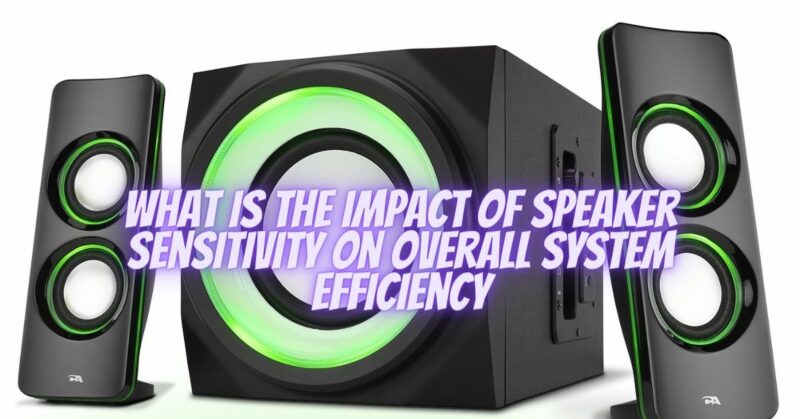Speaker sensitivity, often referred to as efficiency, plays a crucial role in determining the overall efficiency and performance of an audio system. Understanding the impact of speaker sensitivity is important when selecting speakers and designing audio setups. In this article, we will delve into the concept of speaker sensitivity and explore its influence on overall system efficiency.
- Understanding Speaker Sensitivity:
Speaker sensitivity refers to the measure of how effectively a speaker converts electrical power into sound energy. It is typically expressed in decibels (dB) and represents the sound pressure level (SPL) generated by a speaker at a given distance when driven by a specified amount of electrical power. The sensitivity rating indicates how loud a speaker can get for a given input power.
- Implications for System Efficiency:
The sensitivity rating of a speaker has several implications for overall system efficiency:
a. Power Requirements: Speakers with higher sensitivity ratings require less electrical power to produce a certain sound level compared to speakers with lower sensitivity ratings. This means that a speaker with higher sensitivity can deliver higher volume levels using the same amplifier power, resulting in greater system efficiency.
b. Amplifier Considerations: Speakers with higher sensitivity ratings are more compatible with low-power amplifiers or receivers. They can produce satisfactory sound levels with modest amplifier power, making them suitable for applications where power efficiency is desired or where lower wattage amplifiers are preferred.
c. Dynamic Range: Speakers with higher sensitivity ratings have a wider dynamic range, allowing them to accurately reproduce both soft and loud sounds. This characteristic is particularly important in audio systems where a wide range of volume levels is required, such as in home theaters or live sound setups.
d. Distortion and Clipping: When speakers are driven beyond their maximum power handling capabilities, they can distort or clip the audio signal. Higher sensitivity speakers are less likely to be pushed to their limits, reducing the risk of distortion and maintaining cleaner sound reproduction.
- Practical Considerations:
When selecting speakers for your audio system, it is important to consider the following practical implications of speaker sensitivity:
a. Room Size and Listening Distance: The sensitivity of the speakers should be appropriate for the room size and the desired listening distance. In larger rooms or when the listener is seated farther away from the speakers, speakers with higher sensitivity ratings are generally recommended to ensure adequate sound levels without straining the amplifier.
b. Speaker Matching: If you have multiple speakers in your setup, it is beneficial to choose speakers with similar sensitivity ratings. This ensures balanced sound reproduction and prevents one speaker from overpowering the others.
c. Speaker Placement and Room Acoustics: The impact of speaker sensitivity can be influenced by the room acoustics and placement. Consider the room’s reflective surfaces, size, and speaker positioning to optimize sound distribution and overall efficiency.
Conclusion:
Speaker sensitivity directly affects the efficiency and performance of an audio system. Higher sensitivity ratings allow speakers to produce louder sound levels with less electrical power, leading to improved system efficiency. When selecting speakers, it is important to consider the room size, listening distance, and the specific requirements of your audio setup. By choosing speakers with appropriate sensitivity ratings and ensuring proper speaker placement, you can achieve optimal sound levels, maintain system efficiency, and enjoy a satisfying audio experience that is both powerful and precise.


